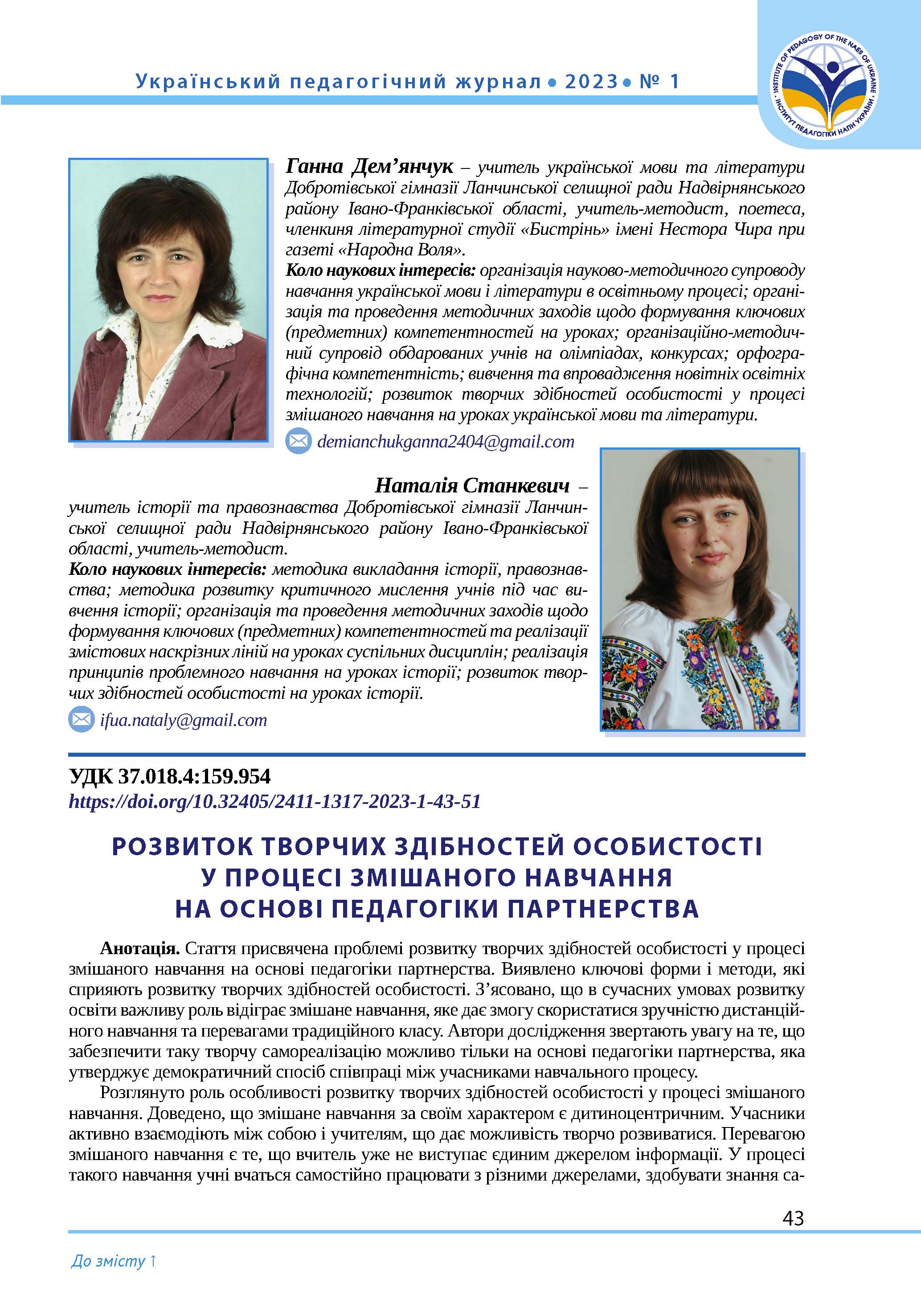Abstract
The article is devoted to the problem of the development of creative abilities of the individual in the process of blended learning based on partnership pedagogy. The key forms and methods that contribute to the development of the creative abilities of the individual have been identified.
It has been found that in the modern conditions of education development, blended learning plays an important role, which makes it possible to use the convenience of distance learning and the advantages of a traditional class, where students learn to work independently with various sources, to acquire knowledge independently. The authors of the study draw attention to the fact that it is possible to ensure such creative self-realization only on the basis of partnership pedagogy, which establishes a democratic way of cooperation between the participants of the educational process.
The role of the development of individual creative abilities in the process of blended learning is considered. It has been proven that blended learning is child-centered in nature. Participants actively interact with each other and the teacher, which provides an opportunity to improve creatively. The advantage of blended learning is that the teacher is no longer the only source of information. In the process of such training, students learn to work independently with various sources, to acquire knowledge independently. It enables better assimilation of information, develops independence, ability to make decisions, cooperation skills, etc.
It has been found that the use of gamification in the process of blended learning increases the motivation of students and promotes the development of creative abilities of the individual. This is a great way to get feedback in a playful way, conduct reflection, and discuss learning topics together.
The use of gamification in the educational process increases the interest of students and their motivation, promotes emotional involvement and social interaction between peers, and also promotes the development of creative abilities of the individual.
It is emphasized that every teacher must adhere to the principles of partnership pedagogy in his/her practical activities in order to realize the mission of the Ukrainian national school, which consists in educating Ukrainians, comprehensively developed, responsible citizens and patriots capable of development and innovation.
References
Барабаш, О. (2018) Педагогіка партнерства – сучасний тип взаємодії між учасниками освітнього процесу. Учитель початкової школи, (8), 3‒7.
Баханов, К. (2004) Інноваційні системи, технології та моделі навчання історії в школі: монографія. Запоріжжя: Просвіта.
Бібік, Н. (2018) Нова українська школа: порадник для вчителя. Київ: Літера ЛТД.
Калошин, В. Ф. (2008) Розвиток творчості учнів: методичний посібник. Харків: Основа.
Ковальчук, В. А. (2022) Педагогічне партнерство як основа розвитку сучасної системи освіти та інституту сім’ї. Теоретико-практичні засади партнерської взаємодії соціономічної та освітньої сфер: збірник наукових праць за матеріалами міжрегіонального науково-методичного онлайн-семінару (Хмельницький, 26 квітня 2022 р.), 89‒93.
Крамаренко, С. (2002) Інтерактивні техніки навчання як засіб розвитку творчого потенціалу учнів. Відкритий урок, 5‒6, 7‒11.
Кухаренко, С. М. Березенська, К. Л. Бугайчук, Н. Ю. Олійник, Т. О. Олійник, О. В. Рибалко, Н. Г. Сиротенко, А.Л. Столяревська (2016) Теорія та практика змішаного навчання: монографія. Харків: Міськдрук.
Переяславська, С., Смагіна, O. (2019). Гейміфікація як сучасний напрям вітчизняної освіти. Відкрите освітнє середовище сучасного університету. https://doi.org/10.28925/2414-0325.2019s24
Пометун, О. (2004) Сучасний урок. Інтерактивні технології навчання: науково-методичний посібник. Київ: Видавництво А.С.К.
Сисоєва, С. О. (2001) Педагогічні технології у неперервній професійній освіті, Київ: ВІПОЛ.
Тадеуш, О. М. (2020) Освітнє партнерство у просторі вищої школи: вітчизняний та зарубіжний досвід. Педагогічна освіта: теорія і практика, 33 (1), 57‒69.
Чугай, О. Ю. (2015) Змішане або гібридне навчання як трансформація традиційної освітньої моделі. Новітні освітні технології в контексті Євроінтеграції: Матеріали X Міжнародної науково-практичної конференції. 14 січня 2015 р., Київ: ЦУЛ, 154‒158.
Шульга, А., Дідух, В. (2020) Можливостi дистанцiйної освiти в педагогiцi партнерства. Актуальнi питання гуманiтарних наук, 29 (4). 256‒262.

This work is licensed under a Creative Commons Attribution-NonCommercial-ShareAlike 4.0 International License.

